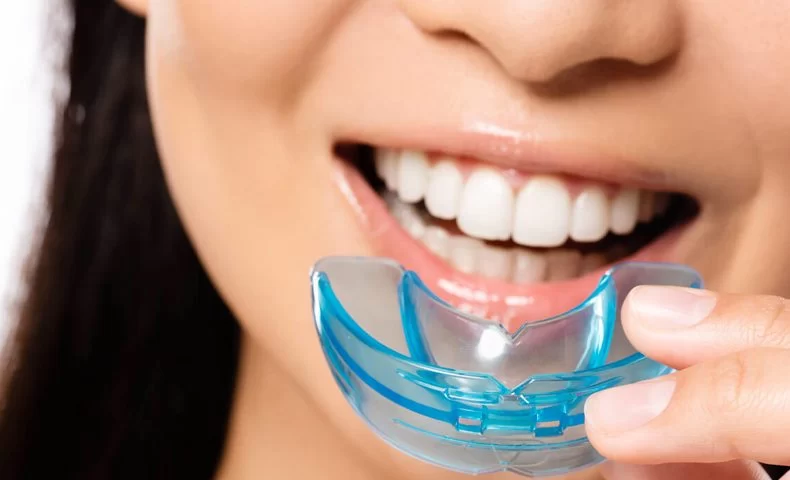
How to Prevent Tooth Grinding at Night: Tips for a Better Night's Sleep
- 1. Understanding Tooth Grinding (Bruxism)
- 2. Causes of Nighttime Tooth Grinding
- 3. Consequences of Bruxism
- 4. How to Prevent Tooth Grinding at Night
- 5. Natural Remedies to Stop Tooth Grinding
- 6. Dental Solutions for Bruxism
- 7. Real-Life Story: Overcoming Bruxism
1. Understanding Tooth Grinding (Bruxism)
Tooth grinding, or bruxism, is a condition where individuals unconsciously grind or clench their teeth, often during sleep. While this behavior is common, especially at night, it can lead to a range of problems if left untreated. Understanding how to prevent tooth grinding at night starts with recognizing the signs and knowing what causes it.
2. Causes of Nighttime Tooth Grinding
Tooth grinding can be triggered by a variety of factors. Some common causes include:
- Stress and Anxiety: High levels of stress are one of the leading causes of bruxism. People often grind their teeth during sleep as a way of subconsciously managing stress or anxiety.
- Misaligned Teeth: If your teeth don't align properly, it can cause you to clench or grind your teeth while sleeping, leading to bruxism.
- Sleep Disorders: Conditions like sleep apnea or snoring can also contribute to nighttime teeth grinding.
- Caffeine and Alcohol: Excessive consumption of caffeine or alcohol before bed can increase the chances of grinding teeth while sleeping.
- Medications: Some medications, including antidepressants, can have side effects that lead to bruxism.
3. Consequences of Bruxism
If not addressed, nighttime teeth grinding can lead to a variety of dental and health issues, such as:
- Tooth Damage: Chronic grinding can cause your teeth to wear down, crack, or chip, leading to costly dental treatments.
- Jaw Pain: Bruxism often causes soreness or tension in the jaw, which can lead to temporomandibular joint (TMJ) disorders.
- Headaches: The constant clenching of teeth can trigger frequent tension headaches and migraines.
- Gum Recession: Grinding may contribute to gum recession, which can make your teeth more sensitive and prone to decay.
4. How to Prevent Tooth Grinding at Night
Learning how to prevent tooth grinding at night involves a combination of behavioral changes, relaxation techniques, and potential dental treatments. Here are some steps you can take:
- Manage Stress: Since stress is one of the main triggers for bruxism, incorporating relaxation techniques into your daily routine can help. Yoga, deep breathing exercises, and meditation can significantly reduce stress and the likelihood of grinding your teeth at night.
- Establish a Relaxing Bedtime Routine: Before going to bed, create a calm and soothing environment. Avoid screens, and consider taking a warm bath or reading a book to help relax your mind and body.
- Avoid Stimulants: Avoid consuming caffeine and alcohol before bed, as both can increase muscle tension and exacerbate tooth grinding.
- Wear a Night Guard: A custom-fitted night guard from your dentist can protect your teeth from grinding and reduce the pressure on your jaw during sleep.
5. Natural Remedies to Stop Tooth Grinding
Alongside professional treatments, there are natural remedies that may help reduce the occurrence of nighttime teeth grinding. Consider these options:
- Magnesium Supplements: Magnesium has been shown to help relax muscles, and taking a supplement before bed may reduce clenching and grinding.
- Warm Compress: Applying a warm compress to your jaw before sleep can help relax the muscles and reduce the tendency to grind your teeth.
- Herbal Teas: Drinking herbal teas such as chamomile or valerian root can help promote relaxation and reduce stress, making it easier to fall asleep without grinding your teeth.
6. Dental Solutions for Bruxism
If you're struggling to prevent tooth grinding at night, consulting with a dentist is a good idea. A dentist may recommend the following treatments:
- Custom Night Guards: These are tailored to fit your mouth and can provide cushioning for your teeth, helping to reduce damage from grinding.
- Orthodontic Treatment: If misaligned teeth are the cause of bruxism, braces or other orthodontic solutions can help correct the issue.
- Botox Injections: In some cases, Botox injections in the jaw muscles can help reduce the intensity of clenching and grinding, especially in severe cases.
7. Real-Life Story: Overcoming Bruxism
Take the case of Sarah, a 42-year-old woman who had been grinding her teeth at night for years. "I woke up every morning with jaw pain and terrible headaches," she recalls. "I had no idea what was causing it until my dentist suggested I might have bruxism." Sarah started using a custom night guard and incorporated stress-relief practices into her routine. Within a few months, her symptoms significantly improved, and she no longer wakes up with discomfort. "The night guard really made a difference," Sarah says, "and the relaxation techniques helped me reduce the stress that was triggering the grinding."
Sarah's story is a reminder that with the right approach, it is possible to manage bruxism and prevent tooth grinding at night.
If you are struggling with tooth grinding, it’s important to consult a dentist for personalized treatment options. For more information on how to stop grinding teeth while sleeping, visit Dentistry Toothtruth for expert advice and solutions.







 Sunnymead Ranch Dental Center4.0 (465 review)
Sunnymead Ranch Dental Center4.0 (465 review) Courtney Hardin0.0 (0 review)
Courtney Hardin0.0 (0 review) Ramsey Family Dental5.0 (93 review)
Ramsey Family Dental5.0 (93 review) Cain Orthodontics, PC4.0 (95 review)
Cain Orthodontics, PC4.0 (95 review) Birch Lake Dental4.0 (258 review)
Birch Lake Dental4.0 (258 review) Legacy Family Dental4.0 (691 review)
Legacy Family Dental4.0 (691 review) The Importance of Oral Health Education During Pregnancy for a Healthy Pregnancy
The Importance of Oral Health Education During Pregnancy for a Healthy Pregnancy Best Tips for Brushing Your Teeth Properly for Healthy Gums: Essential Techniques for Oral Health
Best Tips for Brushing Your Teeth Properly for Healthy Gums: Essential Techniques for Oral Health Why Skipping Dental Checkups Can Lead to Bigger Oral Health Problems
Why Skipping Dental Checkups Can Lead to Bigger Oral Health Problems Advantages of Porcelain Dental Restorations
Advantages of Porcelain Dental Restorations How Can Diabetes Cause Tooth and Gum Problems? Preventing and Managing Oral Health Issues
How Can Diabetes Cause Tooth and Gum Problems? Preventing and Managing Oral Health Issues Healthy Habits for Promoting Good Oral Health and Hygiene: Tips for a Healthy Smile
Healthy Habits for Promoting Good Oral Health and Hygiene: Tips for a Healthy Smile